In the scenario I present to you, my solution is supposed to represent O(n^2 * log n), and the "pointers" solution, which I assume is the fastest way to resolve the "3SUM" problem, represents O(n^2 * 1); leaving the question of is O(1) faster than O(log n), exampling it with my code.
Could someone explain why this seems to be the case? Please. My logic tells me that O(log n) should be as fast as O(1), if not faster.
I hope my comments on the code of my solution are clear.
Edit: I know that this does not sound very smart... log(n) counts the input (n -> ∞), while 1... is just 1. BUT, in this case, for finding a number, how is it supposed to be faster to do sums and subtractions instead of using binary search (log n)? It just does not enter my head.
LeetCode 3SUM problem description
O(n^2 * log n)
For an input of 3,000 values:
- Iterations:
1,722,085 (61% less than the "pointers solution")- Runtime: ~92 ms (270% slower than the typical O(n^2) solution)
public IList<IList<int>> MySolution(int[] nums)
{
IList<IList<int>> triplets = new List<IList<int>>();
Array.Sort(nums);
for (int i = 0; i < nums.Length; i++)
{
// Avoid duplicating results.
if (i > 0 && nums[i] == nums[i - 1])
continue;
for (int j = i+1; j < nums.Length - 1; j++)
{
// Avoid duplicating results.
if (j > (i+1) && nums[j] == nums[j - 1])
continue;
// The solution for this triplet.
int numK = -(nums[i] + nums[j]);
// * This is the problem.
// Search for 'k' index in the array.
int kSearch = Array.BinarySearch(nums, j + 1, nums.Length - (j + 1), numK);
// 'numK' exists in the array.
if (kSearch > 0)
{
triplets.Add(new List<int>() { nums[i], nums[j], numK });
}
// 'numK' is too small, break this loop since its value is just going to increase.
else if (~kSearch == (j + 1))
{
break;
}
}
}
return triplets;
}
O(n^2)
For the same input of 3,000 values:
- Iterations: 4.458.579
- Runtime: ~34 ms
public IList<IList<int>> PointersSolution(int[] nums)
{
IList<IList<int>> triplets = new List<IList<int>>();
Array.Sort(nums);
for (int i = 0; i < nums.Length; i++)
{
if (i > 0 && nums[i] == nums[i - 1])
continue;
int l = i + 1, r = nums.Length - 1;
while (l < r)
{
int sum = nums[i] + nums[l] + nums[r];
if (sum < 0)
{
l++;
}
else if (sum > 0)
{
r--;
}
else
{
triplets.Add(new List<int>() { nums[i], nums[l], nums[r] });
do
{
l++;
}
while (l < r && nums[l] == nums[l - 1]);
}
}
}
return triplets;
}

